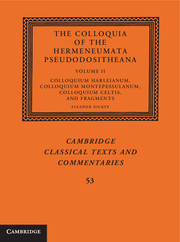Book contents
- Frontmatter
- Dedication
- Content
- List of plates page
- List of figures
- Acknowledgments
- Part One Colloquium Harleianum
- 1 Introduction to the Colloquium Harleianum
- TEXT, TRANSLATION, AND CRITICAL APPARATUS
- 2 Index Siglorum
- 3 Colloquium Harleianum
- Commentary
- 4 Commentary
- Part Two Colloquium Montepessulanum
- 5 Introduction to the Colloquium Montepessulanum
- Text, Translation, and Critical Apparatus
- 6 Index Siglorum
- 7 Colloquium Montepessulanum
- Commentary
- 8 Commentary
- Part Three Colloquium Celtis
- 9 Introduction to the Colloquium Celtis
- Text, Translation, and Critical Apparatus
- 10 Index Siglorum
- 11 Colloquium Celtis
- Commentary
- 12 Commentary
- Part Four Related texts
- 13 Editions of Papyri Connected to the Colloquium Tradition
- 14 The Berlin Trilingual Papyrus (P.Berol. INV. 10582): Reprinted Edition
- 15 Assorted Conversational Fragments(P.Berol. INV. 21860): New Edition
- 16 A Glossary Including Conversational Phrases (P.Lond. II.481): New Edition
- 17 A Glossary of Homonyms with Grammatical Information (P.Sorb. INV. 2069 Verso): Reprinted Edition
- 18 Grammatical Paradigms for Latin Learners (P.Louvre INV. E 7332): Reprinted Edition
- Endmatter
- References
- Indices to volumes I and II
- Index of notable Greek words and phrases
- Index of notable Latin words and phrases
- Index of topics mentioned in the colloquia
- Index of subjects discussed in the introduction and commentary
13 - Editions of Papyri Connected to the Colloquium Tradition
Published online by Cambridge University Press: 25 November 2020
- Frontmatter
- Dedication
- Content
- List of plates page
- List of figures
- Acknowledgments
- Part One Colloquium Harleianum
- 1 Introduction to the Colloquium Harleianum
- TEXT, TRANSLATION, AND CRITICAL APPARATUS
- 2 Index Siglorum
- 3 Colloquium Harleianum
- Commentary
- 4 Commentary
- Part Two Colloquium Montepessulanum
- 5 Introduction to the Colloquium Montepessulanum
- Text, Translation, and Critical Apparatus
- 6 Index Siglorum
- 7 Colloquium Montepessulanum
- Commentary
- 8 Commentary
- Part Three Colloquium Celtis
- 9 Introduction to the Colloquium Celtis
- Text, Translation, and Critical Apparatus
- 10 Index Siglorum
- 11 Colloquium Celtis
- Commentary
- 12 Commentary
- Part Four Related texts
- 13 Editions of Papyri Connected to the Colloquium Tradition
- 14 The Berlin Trilingual Papyrus (P.Berol. INV. 10582): Reprinted Edition
- 15 Assorted Conversational Fragments(P.Berol. INV. 21860): New Edition
- 16 A Glossary Including Conversational Phrases (P.Lond. II.481): New Edition
- 17 A Glossary of Homonyms with Grammatical Information (P.Sorb. INV. 2069 Verso): Reprinted Edition
- 18 Grammatical Paradigms for Latin Learners (P.Louvre INV. E 7332): Reprinted Edition
- Endmatter
- References
- Indices to volumes I and II
- Index of notable Greek words and phrases
- Index of notable Latin words and phrases
- Index of topics mentioned in the colloquia
- Index of subjects discussed in the introduction and commentary
Summary
The six colloquia surviving in manuscript form were not the only ones that existed in antiquity. Probably numerous other versions have now disappeared without a trace, but there are also a few papyri that possibly or certainly preserve fragments of colloquia not known from manuscripts. By far the most important of these is P.Berol. inv. 10582, a codex leaf containing a substantial fragment of an otherwise unattested colloquium related to the colloquium Montepessulanum (cf. section 2.1.3 above). Another papyrus, P.Berol. inv. 21860, may be a glossary rather than a colloquium but contains a high proportion of conversational phrases among its entries, sometimes grouped into meaningful units. A third, P.Lond. ii.481, is certainly a glossary but includes a few scattered conversational phrases. This last is an example of a phenomenon that was probably more widespread, for we have at least one other Latin–Greek glossary containing a few phrases among primarily single-word entries.
Of course, all ancient Latin-learning materials are relevant to the colloquia to some extent, as they shed light on the educational framework in which the phrasebooks evolved. Those materials are listed in vol. i figure 1.1; it is not feasible to provide texts of many of them here, so two have been selected as being particularly important for understanding the ancient educational context in which the colloquia evolved. These are P.Sorb. inv. 2069, a glossary of homonyms that has striking similarities to some of the vocabulary lists in the colloquia, and P.Louvre inv. E 7332, a set of grammatical paradigms providing information on how the grammar-learning described in the school scenes of the colloquia would actually have been conducted.
I have re-edited all the texts presented below in order to verify the readings and interpretations traditionally used. Sometimes such verification proved previous scholarship to be essentially correct, and for those papyri I provide the full re-edition here. In the case of other papyri, however, re-examination of the original revealed significant problems with earlier editions and/or a need for major reinterpretation. In those cases I have worked on the texts in collaboration with other scholars, published the detailed results elsewhere, and provided here only a copy of that re- edition with a short summary of such interpretation as is relevant to readers of this work.
- Type
- Chapter
- Information
- Publisher: Cambridge University PressPrint publication year: 2015



